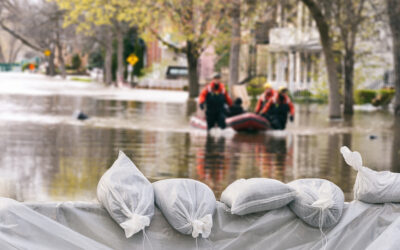While winter officially began on December 21, the onset of cold weather was felt in many areas of the United States much earlier. As we move into what are typically the coldest months of the year, businesses need to be mindful of the safety of their employees — particularly employees who spend some or much of their working day outside.
On the extreme end, winter can bring about unpredictable and dangerous snow and ice storms, like The Great Texas Freeze of 2021 or Winter Storm Elliot in 2022. But even “average,” everyday winter temperatures in some parts of the country can create hazardous work environments if companies and their employees aren’t adequately prepared.
Employee Cold Weather Safety Tips
As a retail agent, you’re in an ideal position to provide your commercial clients with guidance and best practices to strengthen their winter risk management strategies. Here are some tips you can share to ensure employee safety and well-being in cold temperatures.
- Know your area’s winter storm risks and monitor weather conditions. Business owners and managers must stay vigilant about weather trends and changing conditions. If the forecast predicts extreme weather, consider options for adjusting work schedules or delaying outdoor tasks to minimize exposure to harsh elements. Being proactive in response to adverse weather can prevent accidents and injuries.
- Implement winter property maintenance strategies for the business’s buildings and grounds. It’s always a good idea for business owners and managers to conduct a comprehensive safety audit before winter even begins. This may include servicing heating and electrical systems, checking that buildings are properly insulated, and removing overhanging tree branches that might break under the weight of heavy snow or ice. Businesses should also create or review their snow-and-ice removal plans and ensure they have all the proper materials and equipment to clear walkways, parking lots, and building entrances to prevent slips, trips, and falls. Addressing issues and identifying potential hazards early on can have a big impact on employee well-being later in the season.
- Create a winter storm emergency preparedness plan. When it comes to preparedness, businesses should hope for the best and plan for the worst. In winter, this means preparing for snow and ice storms by having a clear evacuation plan and gathering appropriate emergency supplies. Stock emergency kits with essentials like blankets, flashlights, first aid supplies, water, and food. Communicate emergency procedures to all employees and conduct drills to ensure everyone knows what to do in case of an emergency. Visit our blog about preparing for winter storms for more tips and details for emergency situations.
- Maintain proper lighting around the property. Winter days are shorter, and darkness can set in early. Businesses should ensure that all outdoor areas, parking lots, and walkways are well-lit to enhance visibility for employees. Adequate lighting benefits businesses year-round by not only reducing the risk of slips and falls but also deterring criminal activity in dimly lit areas.
- Invest in quality winter gear. For businesses with employees who spend a lot of time outside, the right winter gear is essential. Even if the business doesn’t provide winter apparel and gear, it can still offer helpful information and tips on how employees can best dress for working in inclement weather. This may include, for example:
- Non-slip footwear
- Outerwear that is highly visible in dark and snowy weather
- Waterproofed gear to protect against snow and rain
- Heavily insulated gloves
- Hand and foot warmers, which can be a valuable addition for employees exposed to extremely cold conditions
- Offer flexible work arrangements when possible. During particularly nasty weather, some businesses may be able to offer flexible arrangements, such as remote work options or modified hours. This can help minimize the risk of commuting accidents and accommodate employees who have longer commutes or are uncomfortable traveling in poor conditions.
- Provide adequate shelter against snow, ice, and wind. Wind chill can be a significant factor in cold weather. When wind speeds are at 15 miles per hour, for example, a temperature of 10° Fahrenheit feels like -6.6° Fahrenheit. The lower the temperature and higher the wind chill, the greater the risk of cold stress, so proper protection is crucial. Businesses can install windbreaks or barriers in outdoor work areas to shield employees from biting winds.
If coming indoors for warm-up breaks is not an option, businesses may want to look into installing temporary shelters or heated break areas — stocked with hot beverages, blankets, and seating — where employees can get a reprieve from the cold. This not only helps maintain body temperature but also allows for a brief respite to prevent fatigue and improve overall morale.
- Be on the lookout for signs of frostbite and hypothermia. Businesses should train managers and employees to recognize the symptoms of cold-related illnesses, such as frostbite, hypothermia, trench foot, and chilblains. Emphasize the importance of promptly seeking medical attention if employees experience or observe any signs of cold-related illness. Quick intervention can prevent serious health complications, injury, and fatalities.
- Create and implement regular employee winter safety training. Providing and documenting cold-weather training is a key risk management practice. A business can have top-notch cold-weather safety protocols and measures, but they’re only effective if communicated and put into action. Businesses need to educate their employees on the procedures and options they have in place and encourage open and prompt communication about any safety concerns.
MiniCo: Your All-Season Risk Management Experts
Employee winter safety measures may vary depending on the business, employee job role, and region, but by incorporating safety tips such as the ones outlined above, businesses can create a safer and more comfortable atmosphere for employees, even in the challenging conditions of cold weather. Prioritizing employee workplace safety during the winter months is not just a legal obligation, it’s a crucial aspect of being a responsible commercial property owner or manager.
MiniCo is committed to supporting our retail insurance agents and policyholders with timely and valuable risk management resources. Our team — made up of seasoned underwriters and claims professionals — can work alongside you and your clients to devise risk management strategies for cold-weather operations. From construction to agribusiness to self-storage facilities and beyond, we’re here to assist in navigating winter risks. Contact us for more information and to speak to an expert about one of our 19 exclusive insurance programs.




